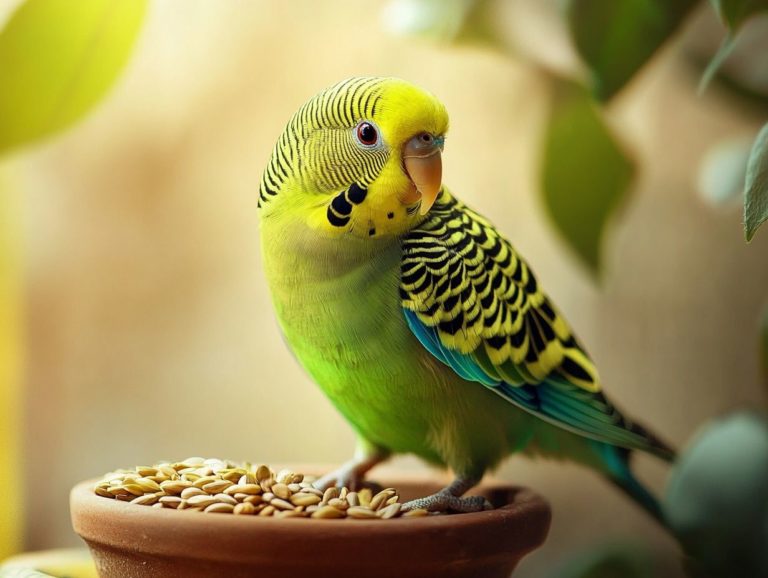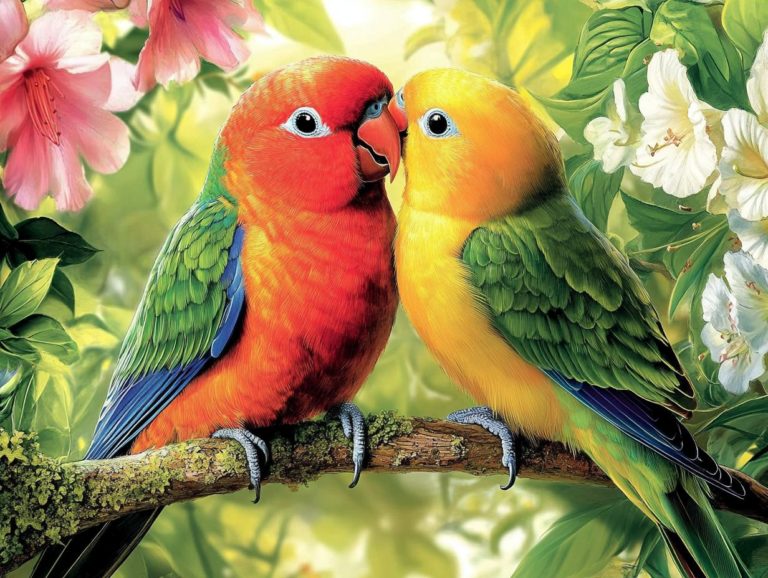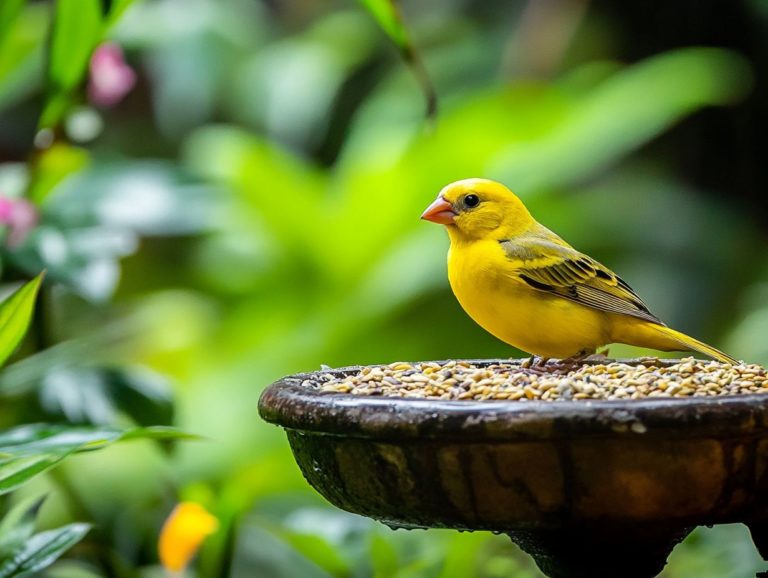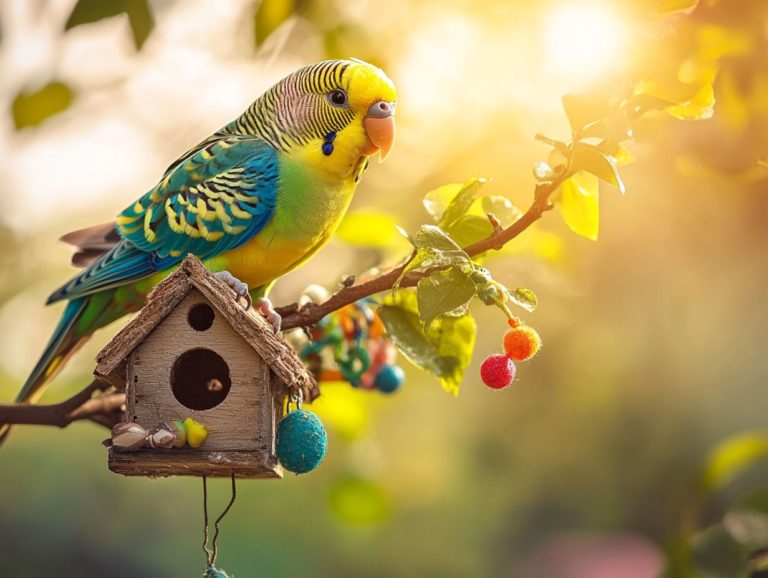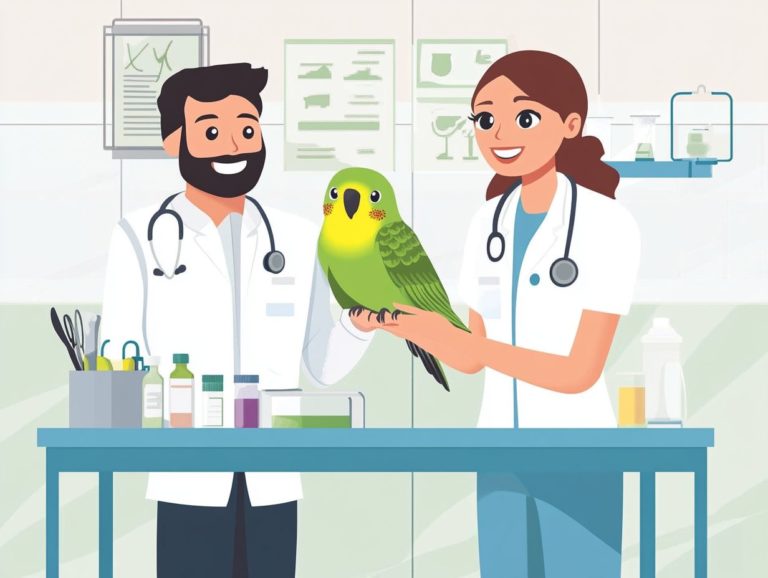Eclectus Parrots: Care Requirements and Tips
Eclectus parrots are truly vibrant and intelligent birds, celebrated for their striking colors and unique personalities that captivate all who encounter them. Their vibrant feathers are a hallmark of their beauty.
Caring for Eclectus parrots is exciting. It requires good knowledge about their diet, habitat, housing, and emotional needs.
This guide provides a comprehensive overview of essential aspects of Eclectus care, encompassing nutrition, environmental necessities, common health concerns, effective training techniques, and pet care. By the end of this guide, you’ll know how to care for a happy and healthy Eclectus parrot, ensuring a rewarding companionship and understanding parrot behavior.
Contents
- Key Takeaways:
- Caring for Eclectus Parrots
- Common Health Concerns
- Training and Bonding with Eclectus Parrots: Understanding Training Tips
- Frequently Asked Questions
- What are the basic care requirements for Eclectus Parrots?
- How often should I clean my Eclectus Parrot’s cage?
- Do Eclectus Parrots need a lot of social interaction?
- What should I feed my Eclectus Parrot?
- Can I train my Eclectus Parrot to talk?
- Are there any special tips for caring for a female Eclectus Parrot?
Key Takeaways:
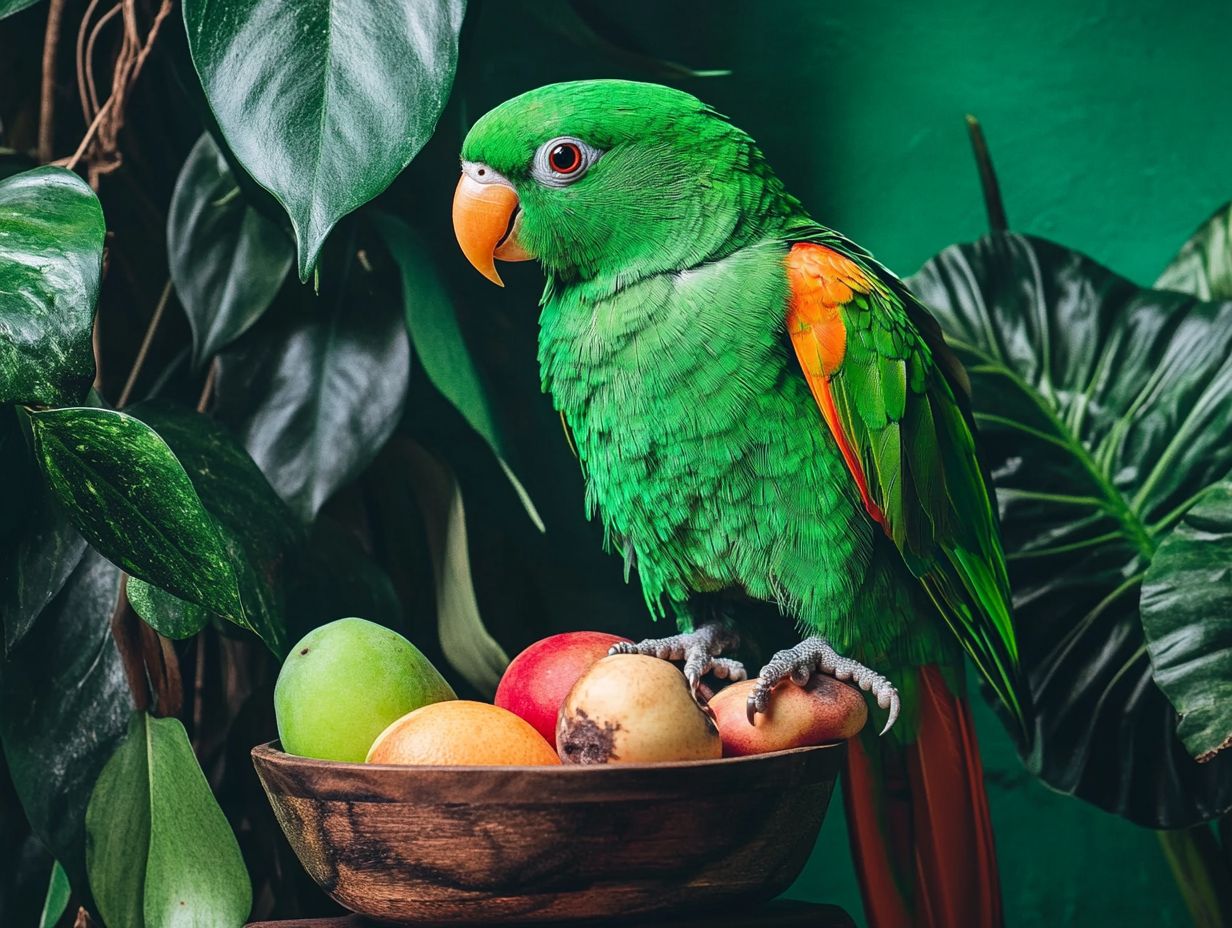
- Ensure a healthy diet with plenty of fresh fruits and vegetables.
- Create a stimulating environment with large cages and exercise opportunities.
- Regular training and bonding activities are essential for building a strong relationship.
Overview of the Species
Eclectus parrots, scientifically known as Eclectus roratus solomonensis, are a captivating species hailing from the lush forests of the Solomon Islands, Indonesia, and New Guinea. Their calm temperament makes them delightful companions. With their stunningly vibrant feathers and calm demeanor, these birds have undoubtedly enchanted avian enthusiasts around the globe. Imagine having a companion that can live for over 30 years, offering joy and companionship throughout its long lifespan.
What s particularly fascinating about these parrots is their remarkable sexual dimorphism, or the difference in appearance between male and female birds. Males flaunt bright green plumage, while females display a striking combination of red and purple. This unique coloration not only enhances their beauty but also serves a practical purpose, providing effective camouflage among the foliage of their natural habitat.
Typically weighing between 400 to 500 grams, they thrive in warm, humid environments where they can indulge in foraging behaviors, searching for fruits, nuts, and seeds, as well as soft foods that suit their unique digestive system. Their gentle disposition makes them excellent pets; they re often described as affectionate and intelligent, flourishing on interaction and mental stimulation.
For anyone considering welcoming one of these remarkable birds into their home, understanding their natural behaviors and needs is essential for fostering a healthy and happy environment, including observing behavior that reflects their emotional state.
Caring for Eclectus Parrots
Caring for Eclectus parrots requires a deep understanding of their unique needs, including their social attention necessities, to ensure they lead happy and healthy lives. Although these stunning birds flourish in low-stress, quiet environments, it’s also valuable to explore resources on macaw maintenance for insights into caring for different species, ensuring that all birds receive plenty of social interaction.
Providing them with spacious housing, including large cages and ample flying space, is crucial to minimize stress-prone behaviors. They need room to move and explore, which is vital for their physical and mental well-being.
With the right care, your Eclectus parrot can thrive and become a beloved member of your family.
Diet and Nutrition
A healthy diet is essential for the health of Eclectus parrots, and it should primarily consist of a variety of fruits and vegetables, focusing on high fruit and vegetable protein to meet their nutritional needs. These birds flourish on a diet rich in fruit and vegetable protein, enhanced by safe options that provide essential vitamins and minerals.
Understanding which foods are potentially toxic, including avoidance foods, is crucial for preventing health issues and ensuring a natural diet that supports their long-term well-being. For optimal health, consider including fruits like papaya, mango, and berries, along with leafy greens such as kale and spinach, which are particularly rich in calcium and should be part of a safe fruits and vegetables list.
Establishing a consistent feeding schedule will help regulate their metabolism, with twice-daily meals proving to be ideal for their unique dietary needs. Avoid avocado, chocolate, and caffeine, as these can be toxic and harmful to them, highlighting the importance of understanding toxic foods.
Incorporating a variety of colorful options not only keeps their meals exciting but also guarantees they receive a well-rounded array of nutrients, vital for their vibrant plumage and overall vitality, while minimizing fat intake.
Environment and Habitat
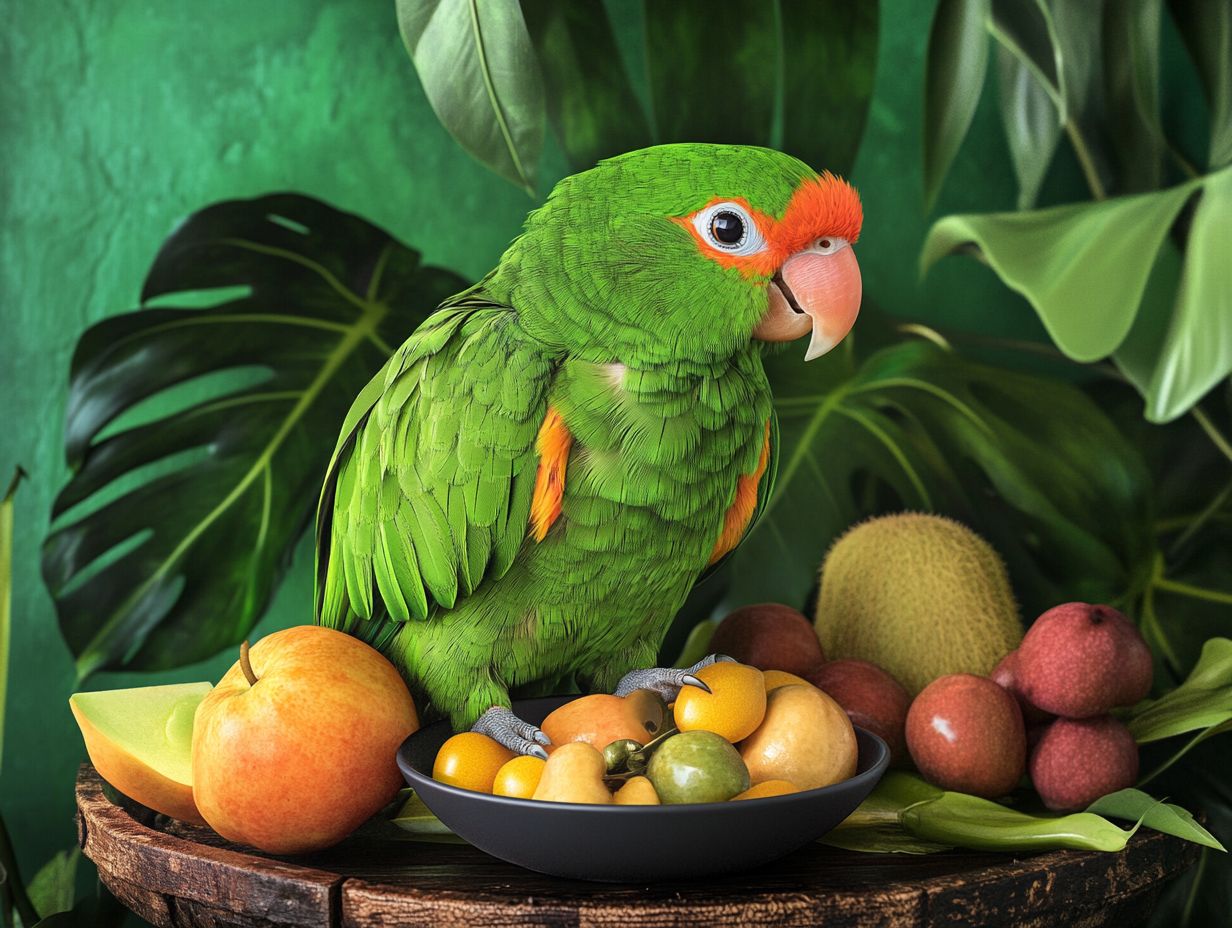
Creating a fun and safe home for your Eclectus parrots is key to keeping them happy and healthy! It s essential to understand their housing needs. They need spacious housing with large cages that offer plenty of flying space, allowing them to stretch their wings and explore, which is crucial for minimizing bad habits.
A cage should measure at least 3 feet wide, 2 feet deep, and 3 feet tall, ensuring they have ample room to move and play. Positioning the cage in a quiet part of your home, away from drafts and direct sunlight, creates a low-stress environment that allows them to observe daily activities without feeling overwhelmed.
To keep them engaged, incorporate various types of toys that stimulate their minds, such as foraging items and interactive puzzles, which promote their exercise and cognitive skills. Complement these with natural perches made from safe wood, promoting foot health and encouraging natural behaviors, which enhances their overall well-being.
By creating a structured habitat that takes these elements into account, you significantly enhance their wellbeing, supporting both their physical health and emotional stability.
Exercise and Enrichment
Regular exercise and mental enrichment are crucial for the well-being of your Eclectus parrots, as they help in recognizing sick birds before serious health issues arise. By providing ample opportunities for physical activity along with engaging toys and perches, you significantly reduce the risk of bad habits.
Personal interaction is just as vital; it fosters social bonding and creates an environment where these intelligent birds can truly thrive. Incorporating a variety of activities like interactive games such as hide-and-seek with their favorite toys can enhance their cognitive skills while keeping them physically active and fostering social attention.
Puzzle feeders are a fantastic way to encourage foraging behavior (searching for food, which is natural for them), challenging their minds and warding off boredom. Ensuring they have space to climb and explore not only aids in their physical conditioning but also mimics their natural habitat, which is essential for their mental well-being.
Clear communication and regular playtime are essential; they build trust and can help alleviate anxiety-driven behaviors often seen in less socialized parrots, promoting their emotional stability. Act now to remove any toxic foods from their environment! By engaging in these nurturing practices, you enrich their lives, creating happier and more balanced companions.
Common Health Concerns
Health concerns in Eclectus parrots can impact their quality of life. Recognizing signs and symptoms early is vital for proper care.
Regular check-ups with a bird doctor are essential. They can help identify potential health issues and nutritional deficiencies, which are problems that can arise from poor care, equipping you with the knowledge to maintain health.
Understanding molting, which is the process of shedding old feathers, and breeding processes helps you monitor their health effectively.
Signs and Symptoms to Watch for
Recognizing sick birds is crucial for maintaining the health of your Eclectus parrots. Early intervention often leads to better outcomes. Pay close attention to important signs, such as changes in appetite, behavior, and communication cues.
By understanding these signals, you empower yourself to take proactive measures in monitoring your parrots’ well-being.
If you notice a significant decrease in food consumption, it may suggest illness, prompting immediate evaluation by a bird doctor. Changes in vocalizations or unusual body posture might indicate discomfort or distress.
Watch for signs of lethargy, feather plucking, or a reluctance to engage socially. These symptoms underscore the importance of vigilance in recognizing sick birds.
Additionally, keep an eye on any changes in droppings. These can offer valuable insights into your parrot’s overall health and prompt necessary preventive measures.
By staying attuned to these various signs, you can effectively communicate potential concerns to bird doctors. This ensures that your feathered companions receive the necessary care without delay, promoting their health and happiness.
Preventive Measures
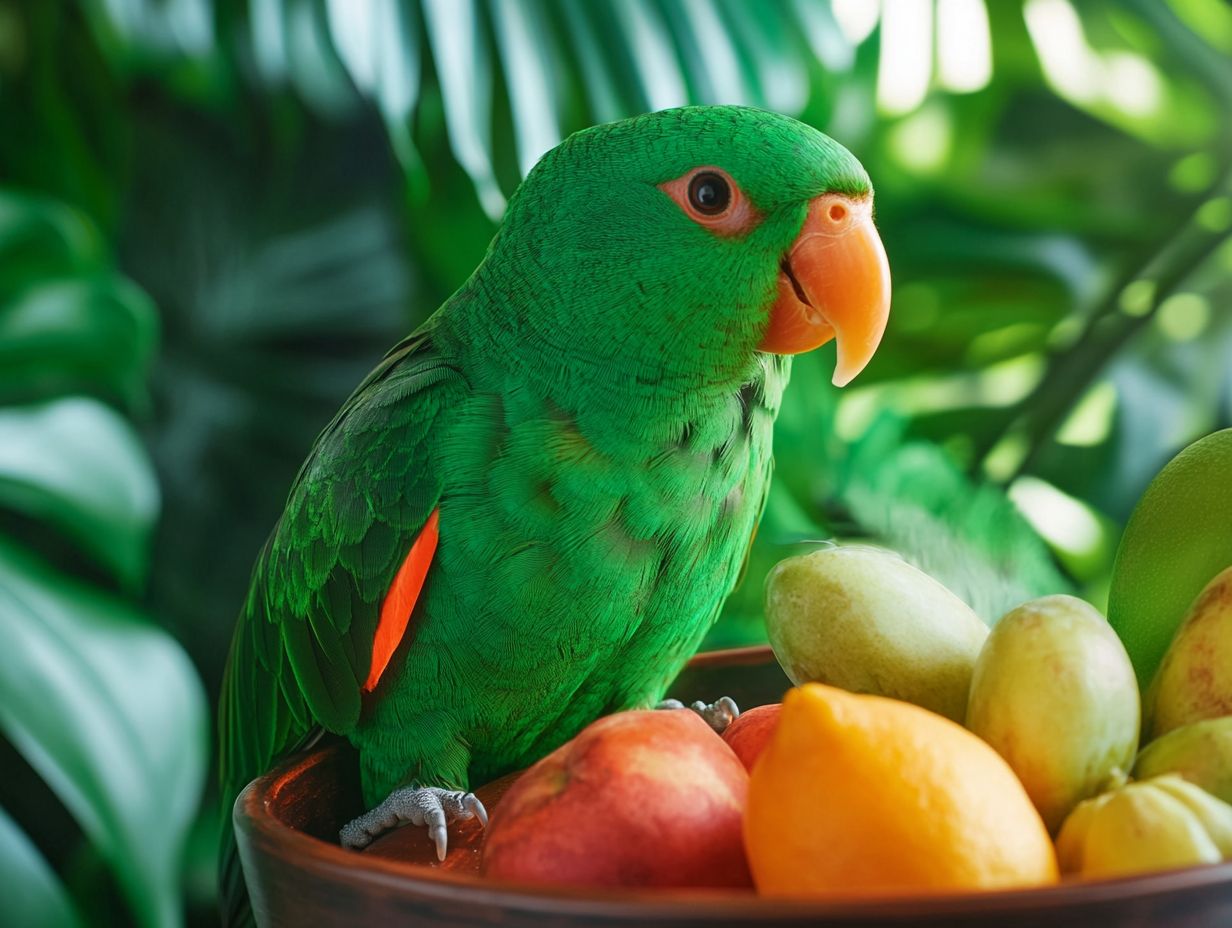
Implementing preventive measures is crucial in avian care. Keeping your Eclectus parrots healthy minimizes the risk of behavioral problems.
Be aware of potential hazards in their environment. Schedule regular health check-ups and manage their diet properly. These steps can significantly reduce the risk of health issues and make pet responsibility a priority.
By prioritizing prevention, you ensure that your parrots lead vibrant and fulfilling lives. Creating a safe space free from toxins supports their physical well-being and addresses their psychological needs, which is essential for emotional stability.
Don’t wait! Schedule regular vet visits to catch health issues early. A balanced diet full of essential vitamins and minerals boosts their immune system and helps curb aggressive or anxious behaviors.
By combining these strategies, you cultivate a thriving environment that promotes the happiness and health of your feathered companions. Take these steps today to ensure their long-term well-being.
Training and Bonding with Eclectus Parrots: Understanding Training Tips
Training and bonding with Eclectus parrots are essential components of responsible pet ownership. These practices enrich the relationship you share with your feathered friend.
Utilizing effective training techniques and gaining insight into parrot behavior enhances social bonding and improves communication.
Recognizing their communication cues deepens your understanding of their needs and preferences. This paves the way for a harmonious companionship built on mutual respect and affection.
Effective Training Techniques
Effective training techniques for Eclectus parrots hinge on the power of positive reinforcement, fostering both learning and trust. By utilizing treats and praise during training sessions, you can address behavioral issues while strengthening the bond with your feathered companion.
Learning to handle your parrot well enhances the training experience. This helps your parrot become more sociable.
Incorporating gentle hand movements and calm vocal tones will create a secure environment that nurtures confidence. Regular schedules and engaging activities significantly reduce anxiety and unwanted behaviors. Many find that adding clicker training to their repertoire accelerates the learning process and encourages the parrot to participate enthusiastically.
Ultimately, these training strategies will create a joyful bond between you and your parrot while ensuring they thrive in a stimulating environment.
Building a Strong Relationship
Building a strong relationship with Eclectus parrots demands dedication to fostering social bonds through consistent interaction. By observing their behavior and recognizing communication cues, you can tailor your approach to meet the specific needs of your feathered friend.
This attention to detail strengthens your bond and ensures a fulfilling experience for both you and your parrot. Engaging in activities like gentle talking, singing, or even mimicking sounds can significantly enhance your interaction, creating a delightful sense of companionship.
Establishing a routine for playtime or training sessions is crucial for fostering trust. Understanding your parrot’s personality and mood allows you to respond effectively, reinforcing a comforting sense of security.
Providing opportunities for exploration and mental stimulation think toys and foraging activities will deepen your connection, leading to a healthier, more vibrant relationship.
Frequently Asked Questions
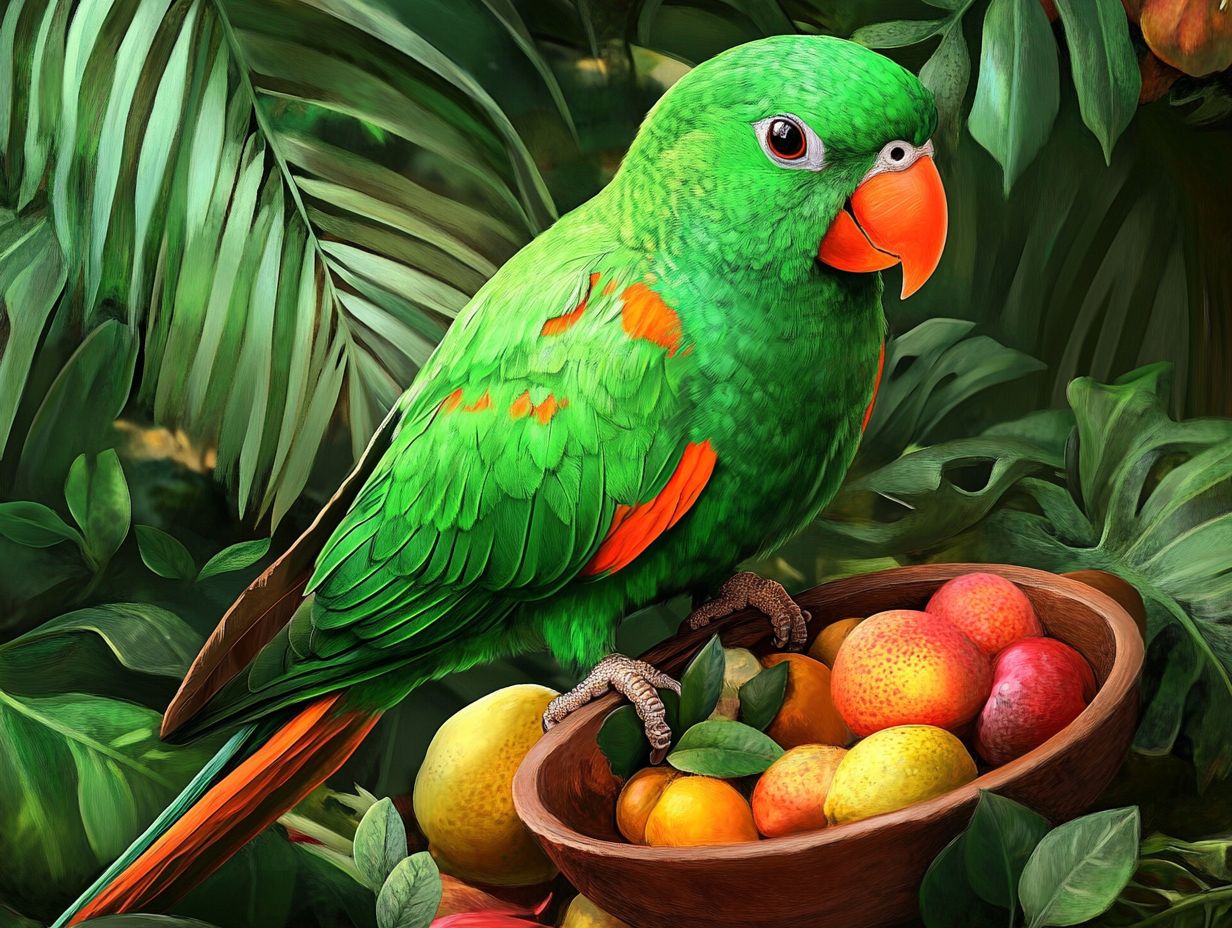
What are the basic care requirements for Eclectus Parrots?
Eclectus Parrots require a spacious cage, a nutritious diet of pellets, fresh fruits, and vegetables, regular grooming, exercise, and mental engagement through toys and social interaction.
How often should I clean my Eclectus Parrot’s cage?
It is recommended to clean the cage and replace bedding at least once a week. Spot cleaning should be done daily to remove waste or uneaten food.
Yes, Eclectus Parrots are highly social birds that thrive on attention and interaction. They should not be left alone for long periods and need daily socialization and playtime.
What should I feed my Eclectus Parrot?
Eclectus Parrots have unique dietary needs and should be fed high-quality pellets, fresh fruits, vegetables, and occasional seeds and nuts. Avoid foods high in fat and sugar.
Can I train my Eclectus Parrot to talk?
Yes, Eclectus Parrots can mimic sounds and can be trained to say words and phrases. However, not all will talk, and training should never be forced.
Are there any special tips for caring for a female Eclectus Parrot?
Female Eclectus Parrots have different dietary needs and require more calcium to support egg production. Provide a calcium supplement and monitor calcium levels through regular veterinary checkups.

